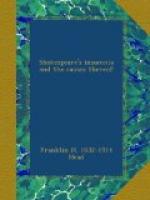from the Chesapeake, called by the natives tobacco.
Make it not into tea, as did one of my kinsmen, but
kindle and smoke it in the little tube the messenger
will bestow. Be not deterred if thy gorge
at first rises against it, for, when thou art wonted,
it is a balm for all sorrows and griefs, and as a dream
of Paradise. And now, my sweet Will, whom
my soul loveth, why comest thou not as of yore
to the “Mermaid,” that I may have speech
with thee? Thou knowest that from my youth
up I have adventured all for the welfare and glory
of our Queen Elizabeth. On sea and on land and
in many climes have I fought the accursed Spaniards,
and am honored recognize thy supreme merit, for
daily and hourly are sung to her the praises of
this loveliness until the story is as a tale that is
told and a weariness to the understanding; but
thy commendations of her wisdom will be as fresh
and fragrant incense, nor will their truthfulness
be too closely scanned.
Thou knowest that I have taken all knowledge to be my province, and therefore have I oft and longingly gazed into the flowery fields of that divine art where to-day in our much-loved England thou art disporting thyself supremely and alone. But when I consider thy tragedies, throughout which is diffused the inmost soul of poesy, my crude yet labored metres seem to me as the body of a maiden, not indeed devoid of a certain comeliness and grace, yet into whose waiting bosom hath not yet been breathed the spirit of life.
In thy tragedies thou hast the majestic grace which in the Attic ages belonged to Sophocles alone; thou hast the stately march and music of Aeschylus, without in thy themes his ceaseless iteration of predestined woe which ranks his heroes outside humanity; yet the sombre hand of fate hath not more inflexibly driven the gentle Iphigenia to her doom than it hath followed Macbeth to his foreshadowed crime and end. But in thy canticles it is not an o’ershadowing, mysterious, and tragic fate, but a gracious and loving Providence which, as thyself hath phrased it,
“Holds in
His hands the shears of destiny,
And has
commandment on the pulse of life.”
In comedy, Aristophanes is not thy master, yet must I greatly choose thy tragedies as monuments of thy abiding fame. Funeral dolors rather than bridal carols inspire even the harp of David, beloved of the Lord; and the pencil of the Holy Ghost toucheth ever the shadowed phases of our earthly lives.
I am minded to now advert to another topic from the tale told me by Southampton that thou wert presently to publish a volume of thy sugared sonnets. May I pray thee that this collection compass not the two sonnets written by thee for me in laud of our Queen Elizabeth, and the one of this morning? As thou knowest, these first were presented to our gracious Sovereign as mine own, and did so pleasure her as to chiefly prosper my advancement. Were the true author now




